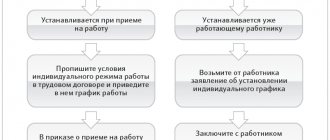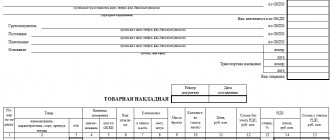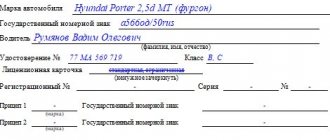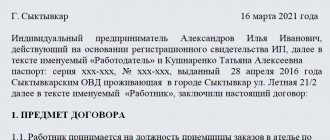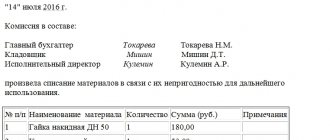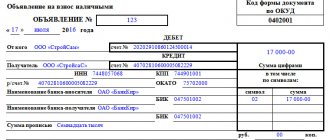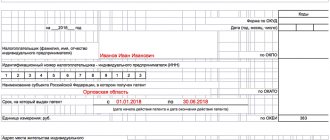Employee encouragement. What it is?
Encouragement means public recognition of success in the professional activities of a team member. The insufficient development of the labor incentive system leads to the fact that conscientious and careless employees are in the same position. This leads to a decrease in incentives to work.
The modern reward system largely depends on the financial capabilities of the employer. This right of organization not only helps to increase labor productivity, but also strengthens labor discipline.
Drawing up an order using the unified form T-11
An order for a bonus (monetary or otherwise) to an employee of an organization in form T-11 is filled out as follows:
At the top of the document indicate the name of the organization and OKPO code.
Next, write down the document number and the date of its preparation.
Information about the rewarded employee is entered (full name, position, structural unit, personnel number).
The motive and type of incentive are indicated.
If the incentive is of a material nature, indicate the amount of monetary reward (in numbers and in words). If the incentive is not monetary, this line can be removed from the document.
Then you need to indicate the name of the document that became the basis for drawing up the order (representation, petition, trade union decision, etc.).
The order for monetary incentives (or otherwise) is signed by the head of the organization. The employee referred to in the order must read the document and sign. The order must also be familiarized with the signature of the person responsible for calculating bonus payments or for processing other employee incentives (for example, the chief accountant, head of the human resources department, etc.).
Forms T-11 and T-11a are unified order forms that can be used to reward an employee for any achievements or events.
Promotion is the main tool for creating a loyal attitude of employees towards the employer.
As a rule, large and serious companies that value their staff develop a bonus system, enshrining its provisions in a regulatory document, for example, Regulations. When a suitable occasion arises, an order is issued to encourage employees. Form T-11a is used to encourage a group of employees, T-11 - for one employee.
To issue an order, you must have a documentary justification; this could be a nomination from the head of the department for an award or a memo that indicates which employee should be rewarded, for what and in what way.
Labor legislation allows employees to be thanked, awarded certificates of honor, and given cash bonuses or material gifts. The Regulations specify what type of reward is provided for various achievements.
All types of incentives should be formalized by order; such actions on the part of the employer encourage employees to work better and better, to strive to fulfill certain indicators for which a reward is provided. In general, a competent bonus system increases staff productivity and improves the performance indicators of each individual employee.
More examples of incentive orders:
Classification of the reward system
Incentives are classified according to various criteria. They can be represented as follows:
| Type of action | Moral | Material |
| Subjective composition | Individual | Collective |
| Circle of encouraged persons | Are common | Special |
| Social significance | For good work | For services to society and the state |
Many modern domestic employers do not see much point in moral encouragement, considering it outdated, since it is not supported by material incentives.
Most of the moral incentives enshrined in labor legislation have become obsolete. But the employer can develop his own modern system. For example, you can consider the experience of foreign companies where moral incentives are common, for example, being included in the list of candidates for promotion. Labor legislation provides for:
| Moral encouragement | Financial incentives |
| Giving thanks | Bonuses |
| Awarding a certificate of honor | Valuable gift |
| Awarding the title “Best in the Profession” |
These are the most common incentive options. This list is not final; the employer can supplement it. Established incentives must be enshrined in the local regulations of the enterprise.
Order on the 13th salary
There is no such term in the current legislation; it is a relic of Soviet times. The 13th salary is a type of monetary incentive paid at the end of the year. The employer's obligation to calculate the 13th salary is not defined by law; this is his right, not an obligation. If a positive decision is made, an order is issued based on form T-11a.
An example of an end-of-year bonus order
The manager may decide not to make such a payment or make it only to a part of the employees. Exception: a situation where the obligation for purpose is enshrined in local regulations. By the way, in budgetary institutions, the internal documents most often enshrine the rule that such a bonus is assigned within the limits of budgetary allocations. Thus, the payment depends on the economic and financial capabilities of the enterprise. After receiving data for the year, the possibility of incentive measures for the workforce is determined.
Stages of registration of incentives
Rewarding is carried out in accordance with the standards established in the documents of the organization. Any fact of economic activity of an economic entity, including incentives for the workforce, must be documented with appropriate documents. The main document in this case is the order of encouragement, drawn up on the basis of a memo, provision for incentives, report, etc. The promotion can be presented in the following sequence:
| Registration stage | Name | Content |
| 1 | The idea of encouragement | Compiled by the head of a structural unit addressed to the manager with a mandatory reference to the regulatory documents according to which the promotion will be carried out. The form of the document is arbitrary. It must indicate information about the employee nominated for promotion, the position held, the period of work at the enterprise, an assessment of his activities and the basis for the promotion. |
| 2 | Order of encouragement | The basis must be written down in this document (a link to the submission and the person who signed it). The employee must be familiarized with the order, about which he leaves a written note in the document. |
| 3 | Entry in personal card | Recording is carried out on the basis of an order. |
| 4 | Entry in the employee’s work book | An entry about the award in the work book is made on the basis of the rules for maintaining work books. In column 3 they write: “Gratitude has been declared for ...”, and in column 4 the date and number of the order of encouragement are noted |
Not every promotion is recorded in the work book. For example, information about the awarding of state awards, certificates of honor, and the conferment of honorary titles must be indicated. And there is no need to record information about bonuses paid regularly.
The Labor Code of the Russian Federation prescribes the employer’s obligation to reflect information about state incentives in the employee’s work book. Entries in the work book about this are made in the same way as records about admission and dismissal (a serial number is entered, information about the promotion is indicated, the number and date of the order on the basis of which it was made are indicated).
There's a place for everything
When issuing orders to reward employees, formulating the features of the internal system and the nuances of its application, special attention should be paid to the most progressive techniques and methods. The most reasonable and fair option is usually to use the following: the better the results, the greater the reward for them. It is important to adopt a system of measures that are understandable to employees and apply them transparently. For any method, the return should be in the short term or in the medium term, that is, the incentive is paid 1-4 weeks from the moment the person achieves success.
If you try to apply systemic incentives to employees of internal affairs bodies, commercial enterprises, and government agencies, planning for long periods of time, it is unlikely that such measures will show the desired result: they simply will not attract people. In order for the reward system to be effective, you need to not only remember about reasonable waiting periods and people’s expectations, but also everyone’s desire to be rewarded in front of the whole team. Rewards should be open, and incentives should be announced to the team so that everyone knows about the success of a colleague. This gives rise to prestige and status, which are additional moral rewards.
Rules and principles of employee benefits
The incentive system at the enterprise must be effective, for which the following rules and principles should be taken into account when developing it:
- incentives must be available to any employee and be systematic;
- the employee must understand for what results of professional activity he is being rewarded;
- incentives must be meaningful to the employee, therefore, when developing their system, information about employee priorities should be analyzed;
- progressive methods increase the effectiveness of the reward system. This means that the amount of incentives should depend on labor productivity;
- promotions should be carried out in a short or medium period. The optimal period may be a week or a month. Promotion for a longer period, for example, a year, can lead to the employee losing interest in the results of his work;
- encouragement should be transparent and open.
The reward system is based on the following basic principles:
- legality. Any encouragement must be within the law;
- openness. Each promotion must be carried out through a notification system for all employees of the organization;
- justice. The nature and amount of incentives should depend on the degree of personal participation of the employee in the work of the enterprise;
- the ratio of material and moral incentives. The reward system should combine both types.
What do the laws say?
The current legislation indicates: remuneration for an employee’s work consists of two main articles - basic and motivational. The first is a reward for tasks performed, the second is a bonus. Basic payments must be paid, strictly within the agreed terms, if the employee fulfills the labor standards specified in the agreement concluded with him. Additional incentives are aimed at stimulating a person to achieve greater success and exceed standards. Using incentives can significantly increase the final amount a person receives, depending on how significant the merit is.
It is wise to fine-tune the work so that the remuneration received by staff corresponds to the achievements of individuals. Bonuses and allowances can effectively stimulate people, especially if used regularly. Typically, bonuses are paid monthly. A collective agreement can stipulate the payment of remuneration in the event of a holiday, significant event in the history of the enterprise or the personal life of an employee. Bonuses will be justified only if the person really makes an important contribution to the company. Data on different bonuses of different types can be recorded in the work book. For this purpose, a specialized section is included in the document. Regularly paid bonuses are not allowed to be included here.
Cancellation of foreclosure as an incentive method
One of the options for moral encouragement is the premature abolition of disciplinary punishment. Previously, labor legislation limited the possibility of awarding bonuses to employees if their disciplinary period had not expired. This Labor Code of the Russian Federation does not contain such restrictions.
However, some employers apply a similar procedure at the enterprise. This is not prohibited by law. The main condition is to reflect the types and system of incentives in the organization’s regulations.
General and special
Of the above reasons for rewarding employees, the first two can be called the most significant and general, while the others are considered special and are implemented only in some enterprises. Stimulation in accordance with special grounds is possible only if the general ones are met. So, no matter how good an employee is, no matter what projects he promotes, no matter how long he works in the company, if he does not comply with discipline, no incentive measures can be applied to him.
To encourage a person, it is necessary for his merits to be noticed by management. The employer can pay attention to them, but there is another option: the team or some employees can write a petition, drawing attention to the successes and merits of their colleague. The authorities receive the request and decide on the application of the incentive, assessing some special merits.
Cancellation of incentives. How to apply?
If the payment is part of the salary and is included in the remuneration system, then its cancellation will entail significant changes in payment and will lead to a deterioration in the employee’s financial situation. Such an action requires advance notification of the employee about upcoming changes and compliance with all requirements established by law.
Cancellation of material incentives provided for by the internal regulations of the enterprise is possible at the discretion of the employer.
There can be many reasons, for example, a changed financial condition of the employer. Such a step must be formalized by an order, which must indicate the date of cancellation of the incentive, the reason and the deadline.
When canceling incentive payments, you need to remember that compensation, for example, additional payments for working on weekends, holidays, and at night, cannot be canceled. Incentives received for services to the state or society can only be canceled by a special decree of the President of the Russian Federation upon the recommendation of the court.
For what purpose does the employer encourage employees?
Personnel bonuses are regulated by a number of articles of the Labor Code of the Russian Federation (Articles 135, 191 of the Labor Code of the Russian Federation). But labor legislation does not say anything about the amount and frequency of payment of monetary remuneration, as well as the method of payment. The incentive motive in a bonus order may be as follows:
conscientious performance by the employee of the duties assigned to him;
increasing labor efficiency;
high achievements in work;
long and impeccable work in the company, etc.
Also, the motivation for the order may be related to labor achievements in a certain industry or professional holidays. For example, an order to reward a teacher may contain the wording “for efficiency in methodological work and high performance indicators”; bonuses for builders may be made “in connection with high performance indicators and a professional holiday - Builder’s Day”, etc.
Art. 191 of the Labor Code of the Russian Federation provides not only for the payment of cash bonuses to employees, but also for other incentive options: awarding a certificate of honor, presenting a valuable gift, declaring gratitude, nominating for the title “Best in the Profession.” It is desirable that the process of rewarding employees be public and carried out in a solemn atmosphere. Thanks to this, other employees will have a motive to increase their work efficiency.
The procedure for issuing incentives must be specified in the internal documentation of the organization (“Regulations on Bonuses”, Internal Rules, etc.).
Regulatory reinforcement of employer incentives
The procedure, sequence and rules for rewarding employees in the organization must be disclosed in detail and recorded in the collective agreement and internal labor regulations. The incentive system in the organization is allowed to be consolidated in a separate document. The provisions of the document establishing the procedure for incentive payments that are not bonuses provided for in the employment agreement (for example, rewarding with a valuable gift) do not require agreement with the trade union. If the issue concerns bonuses, then such approval is mandatory.
Regardless of which document will establish the rules for rewarding employees, it is necessary to describe in detail the conditions, sequence, principles, types and other important aspects of the system. This regulatory act must disclose the procedure for nominating an employee for promotion. It should be indicated who initiates the incentive, the documentation system, timing and frequency.
Memo about bonuses
The basis for issuing an order is a memo, presentation or petition from the employee’s immediate supervisor or the head of another service or department. This document must indicate the employee’s achievements or other grounds for bonuses. The payment amount can be indicated specifically or indicating a percentage of the salary, etc. The head of the enterprise can decide to increase or decrease the monetary reward.
Types of incentive payments to staff
Bonus payments are a multifaceted category that comes in many varieties, depending on the nature of the classifier. Based on taking into account the ability to work and the quality of fulfillment of assigned tasks, bonuses can be issued either individually or to the entire team, division or other structural unit.
Also a popular classification are awards, distinguished by form:
- monetary reward. It is assumed that funds will be transferred to the card, or the bonus will be issued in person;
- expensive gifts. Often men are given expensive watches or cufflinks, and women are given jewelry. Such gifts are typical for professional holidays, anniversaries or special dates.
Among other things, bonus amounts can be divided by purpose:
- due to the employee achieving a specific result set by the production plan, for example, a previously designated period, or due to the fact that tasks have been exceeded;
- based on high-quality execution of additional tasks from the manager.
Thus, the variety of types of bonuses determines the presence of many reasons and motives for encouraging subjects. However, the employer needs to correctly formulate the incentive motive in the bonus order, which will ensure the prompt and lawful delivery of funds to the addressee.
Principles, essence and features
The main purpose of bonuses is to improve and accelerate the quality of work of each employee who is in production and has a certain impact on the ability to work of the enterprise as a whole.
Among the important principles on which the entire employee bonus system is based are:
- fair treatment of each individual employee;
- availability of arguments and grounds for issuing a bonus award;
- calculating the correct premium amount for each individual;
- employees have a desire to work and achieve certain heights in their profession;
- coordination of individual work with work in a team, the ability to get along, negotiate with people and come to a single correct decision;
- initiative and activity in the workplace, the desire to achieve certain success in one’s activities;
- interest in the material component of the bonus;
- encouraging independent and creative work;
- the ability to bear responsibility for the quality and timing of the work done;
- desire to develop further in this area, working on a permanent basis;
- number of material payments;
- understanding by employees of their immediate tasks and responsibilities for future correct implementation.
Sample of filling out form T-11
Art. 191 of the Labor Code of the Russian Federation indicates how you can reward employees for their work - awards, certificates of honor, orders, medals, gifts, money, etc. The list from the specified article of the labor code can be added with any other types of incentives; the list is not closed. As a rule, the types of possible awards are prescribed in an internal local act, a collective agreement or a separate labor agreement concluded with the employee.
Filling out the T-11 or T-11a form is performed by a personnel employee, based on the received documents submitted for award. The use of free order forms is allowed; standard forms are not mandatory in 2020.
The following details should be filled in the form:
- information about the employer's company;
- number and date of filling out the T-11 or T-11a form;
- information about the employee nominated for promotion;
- motive - what the employee should be rewarded for;
- type of award, if a cash bonus is provided, then indicate its size in words and figures;
- document basis - presentation for award, usually drawn up by the head of the department;
- signature of the manager - gives the administrative form legal force;
- signature of the employee indicating familiarization.
Please pay attention to filling out the “motive for encouragement” field; the wording is required.
Examples of motive in a bonus order:
- “For active participation in the event...”;
- “For an innovation proposal submitted by an employee in order to improve product quality”;
- “For the development and implementation of a motivation system”;
- “For quitting smoking during working hours”;
- “For early implementation of the plan by 100%”;
- “For conscientious performance of labor duties”;
- “For achieving high performance in labor”, etc.
If an order for bonuses for employees is drawn up in free form, then it must include all the same details, indicate which employee requires the award, and state the incentive motive and its type.
An employee may be deprived of a bonus under certain circumstances, and a depreciation order is issued.

